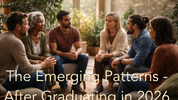2020 has been described as 'extraordinary'. But two recent unprecedented publications have flipped it to 'extraordinary 2.0'.
Firstly, an open letter to President Trump from Archbishop Viganò on 25 October 2020 and secondly, a heavily referenced article by the executive editor of the respected British Medical Association The BMJ on 13 November 2020. Both detail a sorry tale of global corruption and pressures to silence science that does not align to global political objectives. [Both warrant a full read, to appreciate the gravity of what we are facing.]
Kamran Abbasi, executive editor of The BMJ writes, "research published this week by The BMJ, which finds that the government procured an antibody test that in real world tests falls well short of performance claims made by its manufacturers.Researchers from Public Health England and collaborating institutions sensibly pushed to publish their study findings before the government committed to buying a million of these tests but were blocked by the health department and the prime minister’s office."
Increasing Censorship and Wisdom
The increasing censorship of public information can be perceived as protecting the public. It can also be interpreted as blinkering and preventing the public from making informed decisions. People fear what they don't understand, and this is why censorship creates public fear and dependancy. It's only by having full transparency and accountability, can humanity make wiser decisions. Wisdom is the ability of being able to comprehend multiple perspectives.
What Do These Publication Prove?
When reading these two publications in full we begin to realise, it's only when we start looking at things from different perspectives, does the truth emerge. We cannot make wise (informed) decisions while there is censorship and real fake news.
Question
Is it not time to allow voters to decide what is best, rather than the politicians people elected to represent their interests (who may or may not necessarily share voters' views) deciding for them?
The stakes are high for politicians, scientific advisers, and government appointees. Their careers and bank balances may hinge on the decisions that they make. But they have a higher responsibility and duty to the public. Science is a public good. It doesn’t need to be followed blindly, but it does need to be fairly considered. Importantly, suppressing science, whether by delaying publication, cherry picking favourable research, or gagging scientists, is a danger to public health, causing deaths by exposing people to unsafe or ineffective interventions and preventing them from benefiting from better ones. When entangled with commercial decisions it is also maladministration of taxpayers’ money.
 unknownx500
unknownx500

